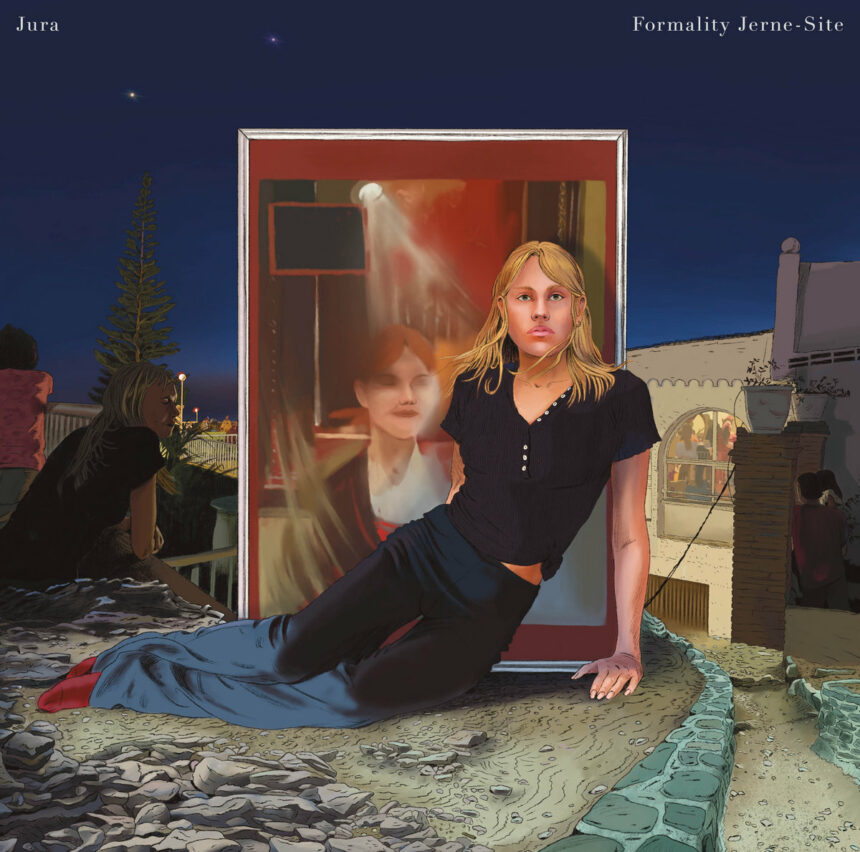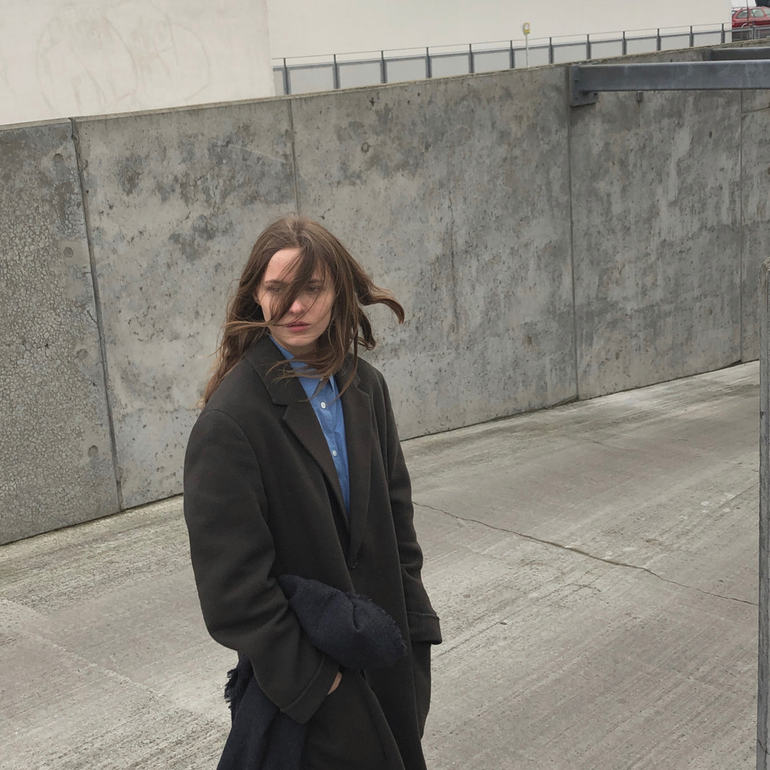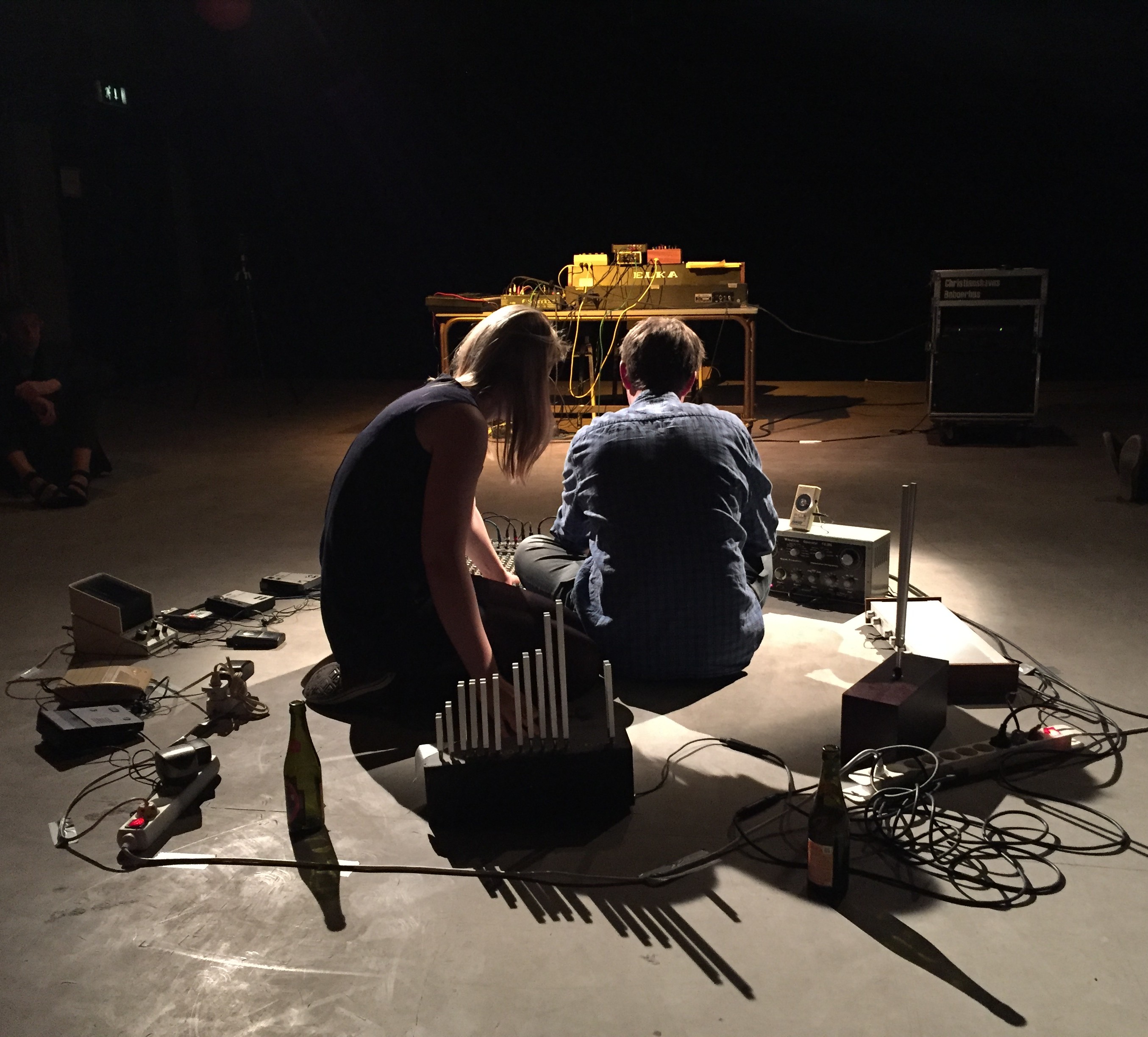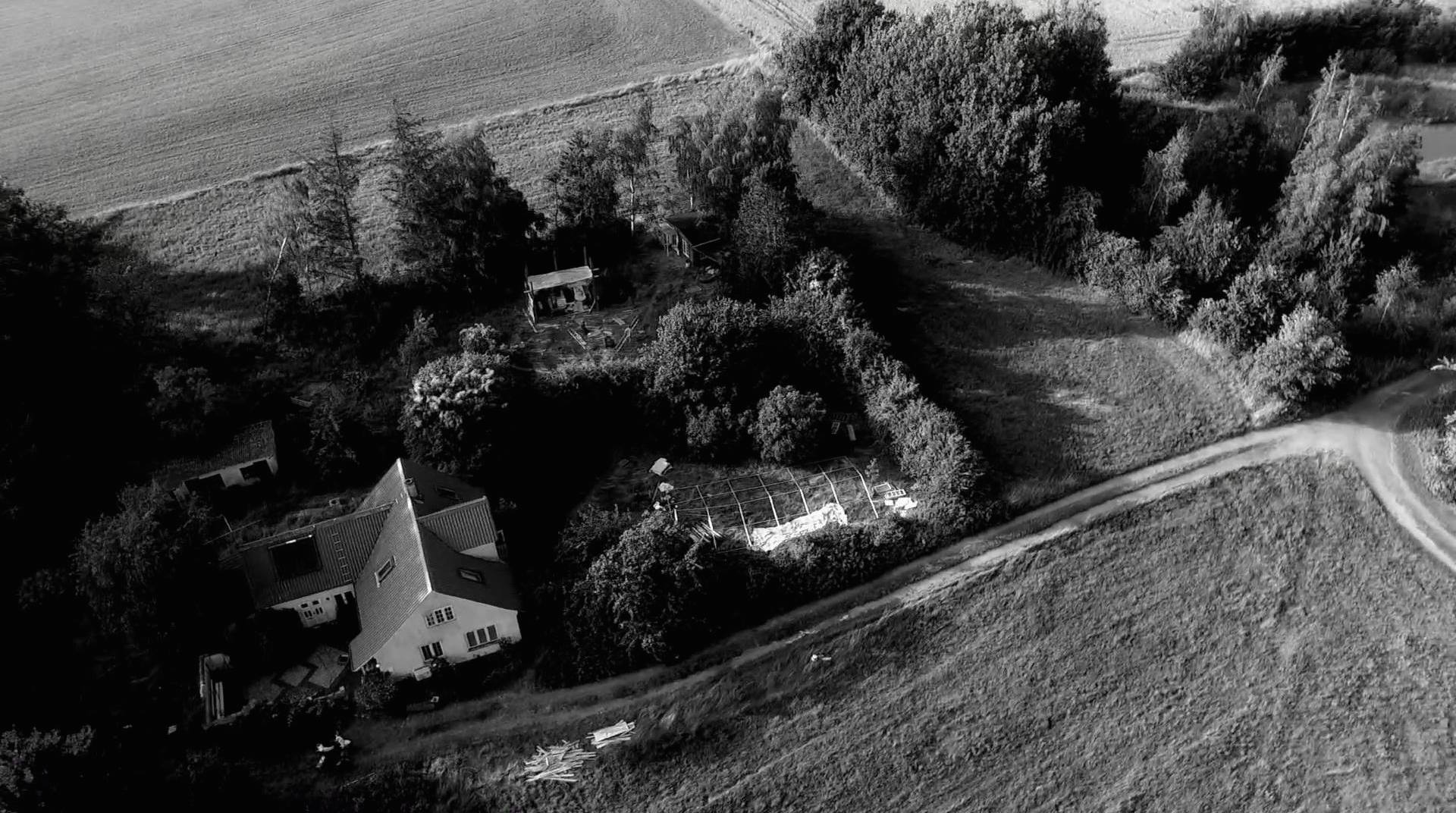Jura – “What do you rely on to let yourself think you have witnessed this beauty?” (interview)

By Macon Holt
When I talked to Jura, she was in London. Why? Well, as it became clear, her main reason for being in the city was simply to be and feel elsewhere. Jura’s debut album, “Formality Jerne-Site”, was released by Anyines in 2022, during P/A’s fallow period, which means that this challenging, elegant, ambivalent and tender record hasn’t had the critical attention it deserves. And talking to Jura added even more dimensions to be explored on the record as a journey through her dislocation.
Based on stories, poems and other texts written in English over the course of a decade, “Formality Jerne-Site” sees Jura expanding and unfolding an aesthetic that she says emerged through her encounters with long-time friend and collaborator, Helene Norup Due. Talking about the album’s name, Jura tells me “It is an attempt of coming up with a name. “Formality Jerne-Site” is basically what happens when I imagine our two [Jura and Norup Due’s] logics meet.” As interesting as the sounds, it is a little difficult to linguistically articulate, what it means. Are these logics of living? Logics of art making? Logics of politics? Logics of bodies? A logic that encompasses it all? But despite this difficulty, it is obvious that Jura on some more significant level, below or in some way inside language, knows exactly what she means by it. Permeating the record and our conversation is a deep, perhaps overwhelming fascination, with structure, formality, organisation and designation. And beyond that a further fascination with the power that actualises these abstract systems, and the ways they impact bodies, hearts and desires.
We can hear one exposing explosion of a system through the use of English on the record and indeed through her artist name. “It’s quite intentional. I guess my universe is an English one. I’m not that interested in investigating the Danish Language. I’m more interested in working with English as someone who is not a native speaker”, she tells me. “What I like about the name “Jura” is that in English, it doesn’t really denote anything. Like, it kind of connotes a geological epoch, or maybe some distant association with a system of law. But I was just interested in the way a name gets to be a name, if you know what I mean. How do you understand me if you come to my work with or without the knowledge of my coming from a Danish context? Then I guess these traces might become more direct. But I’m not sure what the geological era and man-made system of law have in common with me.”
Throughout our conversation, it’s this central tension between the opportunities afforded by the tools of domination that have made this world and the desire to escape them that I find to be most compelling about Jura’s music and approach
Jura is interested in the possibility of a connection or at least interactions through the systemic rather than the specific. But at the same time, the specific can’t help but emerge in such relationships. For example, she tells me about how she responds to Norup Due’s photos of rural Jutland. “Whenever I have seen photos from that region, it is such a Danish thing that it became interesting to try and explain them in English, which made them into fiction that could connect to these pictures of rural areas in other places, like Colorado.” English, then, owing to its dominance, functions as a way to remove the particularities of these paintings that may reduce their relevance to those without a Danish frame of reference. Following Marc Augé, we might criticise such a move as placing the painting in an artistic non-place. But this would be too quick. Other particularities come to the fore, once those of cultural specificity have been smoothed out. Shared sensations that span inhuman geography become visible. This act of translation is like a universalising machine, with all the problematics and potential that implies, that lets the lonely voices of a particular locality find one another. Through English, Jura is able to ride on the networks of colonial history that have structured the world that she and we live in for better and worse. This quasi-universal language is a way of grappling with the opportunities that emerge from a historical privilege while recognising the disorienting struggles in which she is situated. Throughout our conversation, it’s this central tension between the opportunities afforded by the tools of domination that have made this world and the desire to escape them that I find to be most compelling about Jura’s music and approach. For example, she makes use of her extensive training in classical music – a tradition steeped in racism, exclusion and domination but also radical political aesthetic exploration – to question the non-musical systems of power that have established the hierarchies and designations, which have both constrained her and facilitated her life. There is a rich ambivalence here about coping with the world as you find it, even as you want it to be different.
“I was very attracted to the rigidity or formality of things before.”
Jura
The record is comprised of intricately composed MIDI instrumentation with breathlessly racing, lyrically rich vocals performed by Jura herself and a number of collaborators. The sonics on this record have a kind of folded contemporariness about them. The soft artificial echo on the MIDI samples blends like a watercolour painting into the vocal production that suspends every sound at the same level of (un)reality. It’s as if the optimism of early 90s “adult contemporary” electronic music is being rearticulated in the present by the children, now adults, whose internal soundscapes it formed. The instability of the world she is building is further amplified by the structure of her compositions. Fragments of pop music’s recognisability dematerialise, as they come into view. Beats stumble over their own attempts at regularity. On top of this, the vocals carry the dense sentiments of the texts, which are presented with a reverence that also applies a distance between the sonic voice and the textual one. Did Jura author these or was it perhaps some version of her at some point in the last decade? How and in what ways are these people identical or different? This uncertainty makes it so these texts can be treated like some kind of alienated source material to be set to music. A libretto sourced from elsewhere. As she explains, “I was very attracted to the rigidity or formality of things before. I like the idea that this was a textual work. For tricking myself into thinking that these were pre-existing stories or poems (that I may or may not have written myself) that already had their own form and having to respond to that. It’s a kind of old-school composer trick. Almost like commissioned work.”
This near operatic quality is well exemplified on the track “Amephrey and Ontario” which is almost staged as a dialogue between the person of Amephrey, performed by Jura, and the poly-vocal Canadian province of Ontario, performed by the interlocking choral arrangement of abji_hypersun, Ydegirl, Kristoffer Raasted, Clarissa Connelly, ML Buch and Helene Norup Due. And, as one would imagine, the conversation between these entities is quite involved. For example
Amephrey,
I’ve heard that queer peers help each other,
to some sense of superiority,
Introduce me to your kin, the bold,
Nobody’s ever,
gonna reward my bros for their unsurpassed self-control,
For clinging to definedness,
to one aesthetic throughout years foretold.
No Ontario,
I won’t let you fetishize simplicity in peace,
I go to sleep so close to electricity,
I surf on my tongue in its shadow,
How dare you speak,
of the sensibility that you and your bros deem taboo,
just because it’s inaccessible to you?
For me, the grandeur of place, theme, arrangement and personalities on display in addressing what some may think is a mere detail of the experience is reminiscent of Sufjan Steven’s early work. And when I put this to Jura, while this wasn’t her intent it seems like a happy resonance to have put before her. At times, it can feel as if the songs on this record are an attempt for Jura to stake out a position. To argue her case for her particular relationship to those approved ways one can live in this world. But as you delve in and as we talked, it would seem to actually be even more complex than that.
What do you rely on to let yourself think you have witnessed this beauty or connection or logic that stands out? Did you have to imagine a couple of the notes in that chord or were they there? Is this all just your projections?”
Jura
Jura is concerned not only with her legibility and the ability that affords her to exist as herself but with the boundaries of that legibility as such. In the music, this happens through her refusing the easy recognition of genre or formal convention while suggesting such familiarities are always about to arrive. We can hear this when on a track like “Same Late Age (dIcK bIfFeReNcE)”. Its fragmented elements constantly promise a stable groove but whenever it gets close to appearing the easy groove is refused. And this refusal creates its own anti-groove. Jura tells me that what fascinates her is the point at which “a piece of music is understood as what it is in terms of musical language. And then how that language is used to recalibrate or suspend what people think they understand. It’s this constant negotiation, writing music feels like that. But I’m not trying to lay the music bare or deconstruct it.” To explain further she draws an abstract parallel between her work and that of the Danish, minimalist composer, Bent Sørensen. “I’m not doing what he is at all. But I recognise something of my practice in his work. Or, what I feel like I’m dealing with myself. I like how his music makes me question what I just heard. Like, was that something that actually made sense, or did I just think that? And then it has me second-guessing it in a way like “this is so interesting”. What do you rely on to let yourself think you have witnessed this beauty or connection or logic that stands out? Did you have to imagine a couple of the notes in that chord or were they there? Is this all just your projections?”
“I wanted to focus on the bounce that sort of came out from the music. I have been thinking a lot about how I should let the music talk back and whenever I do that, it feels like what it does lasts longer or gleams longer.”
Jura
These kinds of considerations are what give Jura’s work an interesting ethical quality in terms of its relation to an audience. It’s music that draws attention to the listener’s complicity in creating both their musical experience and the emotional experiences that follow. And then the levels proliferate and these emotions construct the musical experience and so on. This leaves one with the question, what is your relationship to Jura in this? What do you owe each other by way of this record? It is not as if you are given free space for invention, however. The discipline of the musical material is precisely calibrated to elicit this response. This is to such an extent that it is incredibly difficult for Jura to figure out if it can be transferred to a live situation. “I should figure that out but I am more interested in the produced expression. It’s more like it is this particular expression that we are listening to.” This kind of control is what ensures the right pieces are missing for Jura and for us.
There is an old rock n roll cliché that a musician has eighteen years to write their first record, and then only two to write the follow-up. And in terms of compositional methods, Jura seems to have embraced this truism. This first record saw her attempting to faithfully represent a decade of texts in music. There just isn’t time for this for the next project. But more than that it seems like Jura wants to redistribute power in her music. “I wanted to focus on the bounce that sort of came out from the music. I have been thinking a lot about how I should let the music talk back and whenever I do that, it feels like what it does lasts longer or gleams longer.” Specifically, she wants to explore the potential of choral singing; to make a choir of soloists. I ask if there is something intimate about this kind of vocal work that interests her. “I’m not looking for the truth when I sit a manufactured something with someone’s singing voice. It’s more like painting.” And as ever it is the ability to be formally precise that excites her about this project to come, “you get to be very specific about using that for some kind of image.”
Jura’s debut album “Formality Jerne-Site” was released by Anyines in February 2022. She recently presented an audio documentary about her work for The Lake Radio



